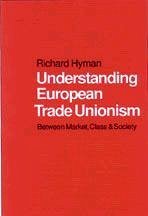'A very innovative study of trade unionism,.... a brilliant analysis of distinct types to be found within Europe' - Marino Regini, Università degli Studi di Milano'This book provides a timely insight into organized labour in an increasingly capitalist world.... It provides a scholarly insight that begs reading by policy makers in labour, business and the government' - Professor Anil Verma, University of TorontoThis engaging and compelling work offers a fresh perspective and demonstrates how inherited traditions can serve as both resources and constraints in responding to the challenges which confront trade unions in today's working world.
Hinweis: Dieser Artikel kann nur an eine deutsche Lieferadresse ausgeliefert werden.
Hinweis: Dieser Artikel kann nur an eine deutsche Lieferadresse ausgeliefert werden.
`Engaging and essential reading for those interested in the historical and recent evolution of trade union movements in Europe' - Construction Labour Research
`The book combines theoretical analyses of trade unionism with short histories... is clearly written, well argued and largely jargon free' - Labour History Review
`[A] detailed and fascinating history of trade unions in the three countries [Britain, German, Italy] and lastly, considers how the unions could recover from the intense disarray of recent years' - Labour Research
`From a deeply reflective reconstruction of well over a century of national trade union experiences, Richard Hyman emerges with incisive questions for the European future. Can there be a co-ordinated diversity of trade union practice? How can a European trade unionism be built from below, rather than through top-down bureaucracies? Everyone concerned over the construction of a truly social Europe will learn much from this thoughtful and probing study' - Professor Colin Crouch, Istituto Universitario Europeo
`Well written and jargon free, this highly original book makes an important theoretical contribution that broadens our perspectives
on Industrial Relations' - George Strauss, Professor Emeritus, Institute of Industrial Relations, University of California, Berkeley
`This book provides a timely insight into organized labour in an increasingly capitalist world. Whether one agrees with Richard Hyman on a role for unions in post-modern societies is unimportant. This book asks all the pertinent questions that need to be asked by anyone curious about the future of trade unions in the twenty-first century. It provides a scholarly insight that begs reading by policy makers in labour, business and the government' - Professor Anil Verma, Rotman School of Management and Centre for Industrial Relations, University of Toronto; Past-President, Canadian Industrial Relations Association.
`A very innovative study of trade unionism, whose overall development is powerfully portrayed while offering at the same time a brilliant analysis of distinct types to be found within Europe' - Marino Regini, Facoltà di Scienze Politiche, Università degli Studi di Milano
From a deeply reflective reconstruction of well over a century of national trade union experiences, Richard Hyman emerges with incisive questions for the European future. Can there be a co-ordinated diversity of trade union practice? How can a European trade unionism be built from below, rather than through top-down bureaucracies? Everyone concerned over the construction of a truly social Europe will learn much from this thoughtful and probing study." - Professor Colin Crouch, Istituto Universitario Europeo
`The book combines theoretical analyses of trade unionism with short histories... is clearly written, well argued and largely jargon free' - Labour History Review
`[A] detailed and fascinating history of trade unions in the three countries [Britain, German, Italy] and lastly, considers how the unions could recover from the intense disarray of recent years' - Labour Research
`From a deeply reflective reconstruction of well over a century of national trade union experiences, Richard Hyman emerges with incisive questions for the European future. Can there be a co-ordinated diversity of trade union practice? How can a European trade unionism be built from below, rather than through top-down bureaucracies? Everyone concerned over the construction of a truly social Europe will learn much from this thoughtful and probing study' - Professor Colin Crouch, Istituto Universitario Europeo
`Well written and jargon free, this highly original book makes an important theoretical contribution that broadens our perspectives
on Industrial Relations' - George Strauss, Professor Emeritus, Institute of Industrial Relations, University of California, Berkeley
`This book provides a timely insight into organized labour in an increasingly capitalist world. Whether one agrees with Richard Hyman on a role for unions in post-modern societies is unimportant. This book asks all the pertinent questions that need to be asked by anyone curious about the future of trade unions in the twenty-first century. It provides a scholarly insight that begs reading by policy makers in labour, business and the government' - Professor Anil Verma, Rotman School of Management and Centre for Industrial Relations, University of Toronto; Past-President, Canadian Industrial Relations Association.
`A very innovative study of trade unionism, whose overall development is powerfully portrayed while offering at the same time a brilliant analysis of distinct types to be found within Europe' - Marino Regini, Facoltà di Scienze Politiche, Università degli Studi di Milano
From a deeply reflective reconstruction of well over a century of national trade union experiences, Richard Hyman emerges with incisive questions for the European future. Can there be a co-ordinated diversity of trade union practice? How can a European trade unionism be built from below, rather than through top-down bureaucracies? Everyone concerned over the construction of a truly social Europe will learn much from this thoughtful and probing study." - Professor Colin Crouch, Istituto Universitario Europeo








